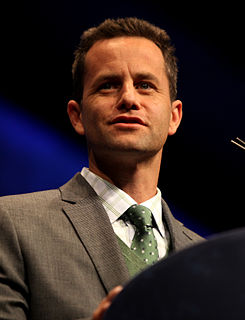A Quote by Kirk Cameron
We all have our convictions formed by different things, and mine are informed by my faith, they're informed by the Word of God, and I found that to be an anchor for me, a compass and a guide for me. When people start bullying one another and calling each other names for those different convictions, then I think you get into problems.
Related Quotes
We all have our convictions formed by different things and mine are informed by my faith.... They're formed by the word of God, and I found that to be an anchor for me, a compass, and a guide for me. When people start bullying one another and calling each other names for those different convictions, then I think you get into problems.
Within childhood behaviors, there are known behaviors; there's teasing and there's name-calling, and different kinds of things happen as kids start to socialize. And then there's serious bullying, and then there's actual aggression and behavioral problems. But you can't put it all under the tent of bullying.
No civilisation can grow unless fanatics, bloodshed, and brutality stop. No civilisation can begin to lift up its head until we look charitably upon one another; and the first step towards that much-needed charity is to look charitably and kindly upon the religious convictions of others. Nay more, to understand that not only should we be charitable, but positively helpful to each other, however different our religious ideas and convictions may be.
If you have a faith, it is statistically overwhelmingly likely that it is the same faith as your parents and grandparents had. No doubt soaring cathedrals, stirring music, moving stories and parables, help a bit. But by far the most important variable determining your religion is the accident of birth. The convictions that you so passionately believe would have been a completely different, and largely contradictory, set of convictions, if only you had happened to be born in a different place.
Do the gods of different nations talk to each other?...Is there some annual get-together where they compare each other's worshippers? Mine will bow their faces to the floor and trace woodgrain lines for me, says one. Mine will sacrifice animals, says another. Mine will kill anyone who insults me, says a third. Here is the question I think of most often: "Are there any who can honestly boast, My worshippers obey my good laws, and treat each other kindly, and live simple generous lives?
The language in New Mexico is very different. At first when you hear the speech here, you don't really know what to do with it, but then I just went with it, because as a writer as well as a translator I do believe that translated words are not different names for the same thing. They're different names for different things. I tried to stay as true as I could, so I used Ruben Cobos' dictionary of Southwestern Spanish, and when I went into Spanish I never assumed the word I would use would be the word a nuevomexicano would use.
I feel like the closest that we get to fulfilling our calling is making a difference in other people's lives. I feel like it's different for everybody. Our purpose and our calling are different. We're all called to do different things. But some way, somehow, it has to be impacting other people. If not, what are you doing? How does it have an impact? How does it have an eternal impact? It has to be investing in other people, somehow making a difference in their lives. When we do that, I really believe that we'll fulfill why we're here and what we're supposed to do.
If you listen to two people who are arguing about something, and they each of them have passionate faith that they're right, but they believe different things---they belong to different religions, different faiths, there is nothing they can do to settle their disagreement short of shooting each other, which is what they very often actually do.


































